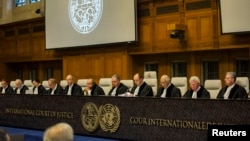The United Nations General Assembly and the Security Council elected four judges Thursday to the International Court of Justice, the main judicial organization of the world body.
In separate, but simultaneous voting, the Assembly and the Council re-elected Ronny Abraham of France and Abdulqawi Ahmed Yusuf of Somalia. Two new justices, Antonio Augusto Cancado Trindade of Brazil and Nawaf Salam of Lebanon, were also elected.
All were elected to nine-year terms, starting in February next year.
Fifth judge delayed
Established in 1945, by the U.N. Charter, the ICJ is the U.N.’s main judicial body. Its mission, in accordance with international law, is to settle the disputes brought by states and to give advisory opinions on legal questions raised by the U.N. bodies and specialized institutions.
Candidates vying for the ICJ chamber were required to win at least 97 votes from the General Assembly and eight from the Security Council. The voting went into five rounds as each country had more than one vote, which complicated the voting process according to observers.
The election of a fifth judge was postponed until Monday after the two competing candidates, Christopher Greenwood of Britain and Dalveer Bhandari of India, deadlocked. Greenwood got a majority votes from the U.N. Security Council but did not receive required votes from the General Assembly. Bhandari of India got his majority from the General Assembly but failed to get enough from Security Council. The two countries are engaged in frantic diplomatic maneuvers at the U.N., diplomats say.
‘Victory for the Somalis’
Somali diplomats at the United Nations were elated to have their candidate win support from a majority of the General Assembly and Security Council. Yusuf was first elected to the chamber in November 2008. During the last three years he served as the vice president of the court.
Somali Ambassador to the U.N. Abukar Osman told VOA Somali that Yusuf’s re-election is a “victory” for Somalis around the world.
“To see a Somali judge being elected for a second time is a big victory for the Somalis, we are grateful to the support from other brothers in Africa — Djibouti, Gabon and others,” Osman said.
Ambassador Osman said Yusuf won support from around the world with a majority of his support coming from Africa, the Caribbean, Asia and Europe.
“The standing and position of Somalia in the international community is returning, that has lifted our spirit, we are very happy to see the revival of Somalia. It’s a good feeling.”
Yusuf, 69, was born in the Somali town of Eyl in the northeast. Formerly he taught International Law at the former Somali University and later on at the University of Geneva. He also worked as a legal adviser to a number of U.N. agencies including UNESCO.




